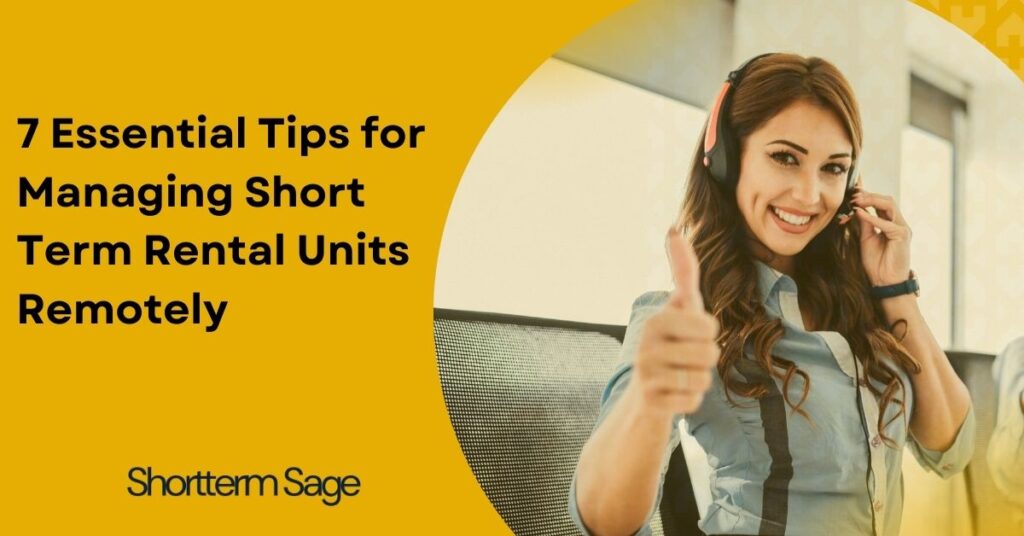
Managing short-term rental units remotely can be a rewarding yet challenging endeavor. With the right strategies and systems in place, you can streamline operations and ensure your properties thrive, even from a distance. Here are seven essential tips to help you effectively manage your rental units without being physically present.
When starting out, it’s highly recommended to manage properties that are close to you. This proximity allows for easier oversight and a personal touch in management. Knowing the local market and the rhythm of operations becomes crucial when you’re directly involved.
However, if you have remote properties, be prepared for a steeper learning curve. You’ll need to establish robust systems and processes to manage these locations effectively.
Building out properties in remote locations can be complex. It often involves coordinating multiple vendors and contractors. You will need a reliable person on the ground who can oversee these operations, ensuring that everything runs smoothly.
This might mean hiring a local property manager or using a service to find individuals who can assist with the setup and ongoing maintenance. It’s essential to have someone you trust to handle these logistics.
An assistant can be a game-changer in managing remote properties. They can handle day-to-day operations, allowing you to focus on scaling your business. Having someone on the ground who can deal with minor issues—like changing batteries in locks or delivering supplies—means you won’t have to interrupt your schedule for small tasks.
For example, if a guest reports an issue, your assistant can respond promptly without you having to drop everything. This efficiency keeps your guests happy and your business running smoothly.
Leverage technology to automate and simplify your management processes. There are various platforms and applications designed for vacation rental management that can help streamline operations, from booking to communication with guests.
Investing in smart home technology can also enhance guest experiences and make it easier to manage properties remotely. Smart locks, thermostats, and security cameras can give you peace of mind and control over your units.
Finding trustworthy local contacts is essential for managing your remote properties. This includes cleaners, maintenance personnel, and even local vendors who can provide services when needed.
Consider using platforms like Thumbtack or TaskRabbit to find local help. Building relationships with reliable individuals in the area can provide you with a support system that enhances your management capabilities.
Establishing clear standards and systems is critical for remote property management. Create checklists for cleaning, maintenance, and guest interactions to ensure consistency across all properties.
These systems will help your assistant and any local contacts know what is expected, making it easier to maintain high standards without your constant oversight.
Remember that short-term rentals are a hospitality business. Your team members, including assistants and cleaners, should embody the spirit of excellent customer service.
When hiring or training staff, focus on finding individuals who are friendly, presentable, and capable of representing your brand positively. This can significantly enhance guest experiences and lead to better reviews and repeat bookings.
Managing short-term rental units remotely is entirely feasible with the right approach. By understanding the importance of local management, organizing build-outs effectively, hiring assistants, utilizing technology, building a network, developing clear standards, and emphasizing customer service, you can create a successful remote management strategy. Start implementing these tips today to ensure your rental properties thrive, no matter where you are.
Our reviews are made by a team of experts before being written and come from real-world experience. Read our editorial process here.
Some of the links in this article may be affiliate links, which can provide compensation to us at no cost to you if you decide to purchase a paid plan. These are products we’ve personally used and stand behind. This site is not intended to provide financial advice. You can read our affiliate disclosure in our privacy policy.
About the author:
This website is operated and maintained by Short Term Sage LLC. Use of the website is governed by its Terms Of Service and Privacy Policy.
Short Term Sage LLC may link to content or refer to content and/or services created by or provided by third parties that are not affiliated with Short Term Sage LLC. Short Term Sage LLC is not responsible for such content and does not endorse or approve it.
We use cookies to help improve, promote and protect our services. By continuing to use this site, you agree to our privacy policy and terms of use.